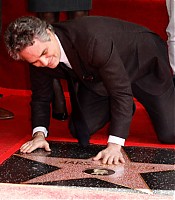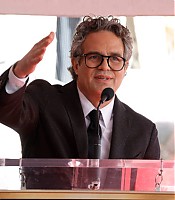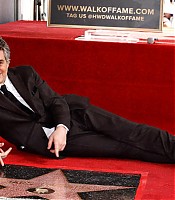Mark Ruffalo on Playing Twins and Why a Bidet Will “Change Your Life”

Talking to the actor about his new HBO series I Know This Much Is True, family, and which big American cover-up he’d love to dive into next.
In the new HBO series I Know This Much Is True, Mark Ruffalo plays identical twins: Dominick, a divorced housepainter consumed with pent-up anger and grief, and his paranoid schizophrenic brother, Thomas. His performances as two different, emotionally complicated men are layered, rigorous, and convincing—so convincing, in fact, that the trailer even fooled his own father. “My dad asked me, ‘so who’d they get to play your brother?’” Ruffalo tells me, in his trademark easygoing cadence, over a Zoom video call from his house in the Catskills, where he’s mostly been spending his time in isolation catching up on long-delayed cleaning projects and reading the news.
Light quarantine escapist viewing this is not: I Know This Much Is True is heavy and raw, with seemingly unrelenting blows of bleakness. Based on the 1998 bestselling novel by Wally Lamb, it was adapted for television by director Derek Cianfrance (Blue Valentine, The Place Beyond the Pines). Ruffalo hadn’t read the 900+ page book before getting the role—which he chalks up to his ADHD—but eventually devoured it in a single weekend to prepare—for which he credits the hyperactive part of his ADHD. Once he did, he was drawn in by the similarities to his background: the second-generation Italian immigrant story, the tight-knit familial bonds.
Ahead of the show’s May 10th premiere, we discuss the technical aspects of playing twins, which big American cover-ups Ruffalo wants to investigate onscreen next, and why he gave Cianfrance a bidet on the last day of filming.
GQ: I understand there was someone acting opposite you as you played each character. What sort of technical work went into portraying twins?
Mark Ruffalo: What was most important was that there were these two different characters that were relating to each other, that had chemistry together, that were listening to each other. That had a feeling of this other kind of communication happening that wasn’t just spoken word but feelings and moods and an understanding of a lifetime together and thinking the same things that twins do. We brought on this great actor, Gabe Fazio, who’s a friend of Derek’s. He created a Thomas, he put on 30 pounds. And he played Dominick. And that was probably one of the most essential things and why it worked as well as it does and why it really does feel like two different, breathing, emotionally complex people that are trying to get by the best they can. And, oddly, they have chemistry together. It works between the two of them.
You paused production for several weeks so that you could prepare to play Thomas. What was that like on a physical level?
I lost 20 pounds to play Dominick so I wouldn’t put on so much weight at [age] 52 to play Thomas. And that seemed like the healthiest way to do it. It was tough. I was never really comfortable at any point during the six months we were shooting. I was either really hungry all the time or I was so grossed out by the thought of food. I just couldn’t put another thing in my mouth.
And then what sort of emotional preparation and studying went into portraying Thomas’s schizophrenia?
Diving into the emotional aspect of Thomas and that constant barrage of negative thinking and negative auditory prompting [involved] kind of really getting my imagination around what that life would be like. And then spending time with Richard Wheaton—he was my technical advisor, a man who’s been living with schizophrenia for 30 to 40 years—who was just a beautiful teacher for me. And then hours and hours of people posting online. People who are living with schizophrenia, who are coming out and speaking about it and taking the stigma out of it. I owe a lot to them and their candor and their journey. It’s scary and it’s mysterious and it’s all-encompassing. The amount of energy it takes to manage a life with it is profound.
As an actor, I think it’s easy to approach someone who’s schizophrenic as “that’s their personality.” And discerning what is personality and what is the mental difference that they’re dealing with is as deep and important an aspect as the mental illness itself.
I read that you gave director Derek Cianfrance a bidet as a gift at the end of filming, which turned out to be pretty prescient. What’s the story behind that?
We were joking one day about Americans having dirty assholes. [Laughing] And that’s why they’re so uptight all the time. It’s a riff off a Jack Kerouac interview about Americans having dirty assholes. But I told him, I used one of those bidets in Europe and I was like, “It’ll change your life, I’m telling you. And you’re never going to have to use toilet paper again.”
And now he’s prepared.
It was kind of an elaborate joke gift, but it was perfect for the pandemic. I don’t know what it is about people and toilet paper in the pandemic but there seems to be an obsession. It has nothing to do with that part of our bodies!
There was recently a viral tweet that read “all movies involving Mark Ruffalo investigating something are good,” which I believe is about Spotlight and Dark Waters. I know there’s a lot to choose from, but is there another big American cover-up that you would like to investigate on film?
Oh wow. It’s been delved into a little bit, but probably what happened with the Iraq War and how we got there and why we were there and who designed that. It seems like America took a turn at that point and the world took a turn at that point that we’re all still dealing with in some way right now. And I just feel like that set something hideous into motion and we’re all paying the price for it—not to mention just the moral cost of our nation.
That, and what happened with the Natives. Really telling that story in a way that is not condescending or easy, but honest. And really, what those treaties meant. Those were agreements between two sovereign nations but we have not followed any of those agreements up to this day. I don’t think we’re ever done an exploration of that on film in an honest way.
And the Iraq War one would be especially relevant now, what with the whitewashing of George W. Bush’s legacy in recent years.
Oh my God. It disgusts me.
The show, about the bond between two siblings, is dedicated to your late brother, Scott, and Derek’s late sister, Megan. Did your shared grief over losing your siblings inform any parts of the project?
Anyone who loses a sibling in an untimely way probably has, along with grief, a real sense of shame. It’s a mystery. A part of your life that isn’t lived but is always with you in a parallel sort of way. You never really get over it. You just sort of get on with it. Those experiences are so universal in our common humanity that when you’re telling that kind of story, you know you’re speaking across all sorts of divides: racial divides, cultural divides, class divides. You’re really getting to the essential of what it’s like to be a human being.
Yeah, there are certain stories where that’s a good place to work from. There’s a lot of personal connection and understanding and experience that inform it in a different way than maybe if I’m playing an oil driller or something that I don’t have any understanding of. You get a deeper cut on it, and your approach is probably much more nuanced because you lived through the experience. Neither of us went into this consciously thinking of that. I knew the depth of a relationship between two brothers—me and my brother were what they call “Italian twins.” We were barely a year apart. Family and siblings were always being pounded into us: “Your blood is thicker than water, don’t let that person come between us, your friends are temporary, your family is forever.” That’s how we survived as immigrants in the United States.
Mhmm.
It’s really loaded. Derek had a similar experience. A couple weeks ago, he sent me that title card and he said, “What do you think of this?” We talk a lot about my brother because Dominick and Thomas’s relationship isn’t very different from ours. Not directly, but in an abstract way: that kind of caring, that kind of messiness, that kind of conflict, that kind of jealousy. All these things that are messy about being a human being all come out in family relationships. He showed me that and he said, “What do you think?” And I said, “Oh yeah, absolutely. This is a love letter to family.”
This interview has been edited and condensed.









